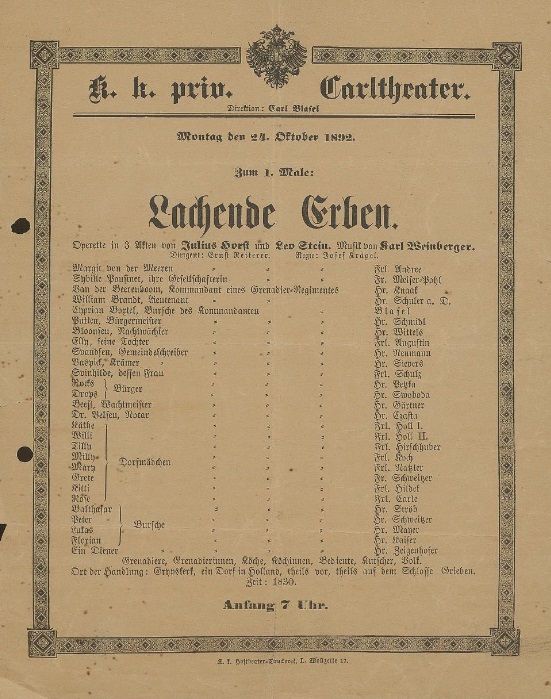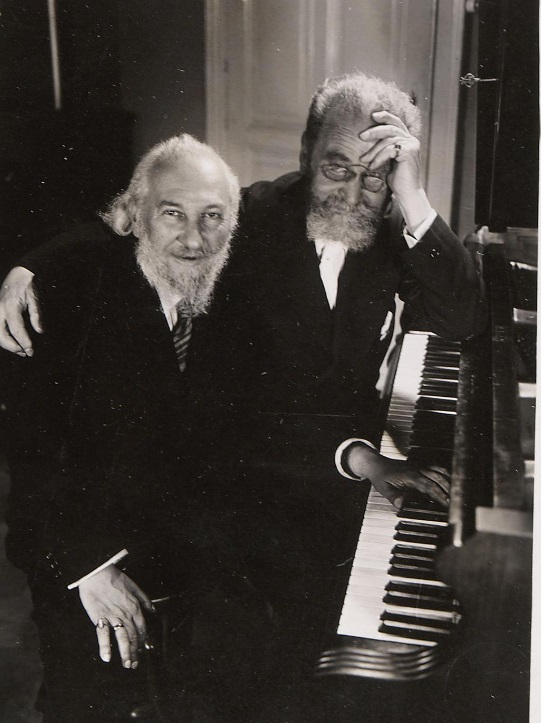Kurt Gänzl
The Encyclopedia of the Musical Theatre
7 March, 2022
Carl [Rudolf Michael] Weinberger was born in Vienna on 3 April, 1861, and he died there on 1 November, 1939.

Carl Weinberger in 1890. (Photo: Rudolf Krziwanek / Theatermuseum Wien)
Although his pieces have long dropped from the schedules, even in central Europe, Carl Weinberger’s attractive dance-rhythmed scores were heard not only in Vienna, but in Germany, in Hungary, in Italy and as far afield as America, during the last decade of the 19th century and the earliest years of the 20th, and he continued to produce music for the theatre until well after the First World War. If none of his Operetten scored the kind of success which would make it last for half a century, he regularly found respectable runs and only a handful of genuine failures.
His first piece, Pagenstreiche, an adaptation of Kotzebue’s comedy (set with rather more success in Hungary by József Konti as A kopé), was produced by Camillo Walzel at the Theater an der Wien when the composer was 27 years of age, and it won only a dozen performances before being withdrawn, but the second, Die Uhlanen, was played 34 times at the Carltheater and again at Berlin’s Thomastheater (30 April 1892), whilst the third, Lachende Erben, won a genuine success. It followed 33 performances in Vienna with a production at Berlin’s Theater Unter den Linden (15 January 1893), another at Budapest’s Budai Színkör (2 June 1893) and was played at New York’s German-language Irving Place Theater (25 December 1893) by José Ferenczy’s touring Operette company.

Playbill for Carl Weinberger’s “Lachende Erben,” 1892. (Photo: Theatermuseum Wien)
Weinberger had a further success with Die Karlsschülerin, played 59 times at the Theater an der Wien with Ilka Pálmay adding not a little to its attractions in the rôle of the leading boy, in Frankfurt, Hamburg and again at Budapest’s Népszinház (Hektor kisasszony 16 May 1903), but two efforts to make an Operette out of Toché and Blum’s French vaudeville La Maison Tamponin (Palais-Royal, 22 March 1893) were less happy: Die Prima Ballerina was played 25 times at the Carltheater and again at Berlin’s Thalia-Theater (24 October 1896) whilst Auch so eine!, produced six years later at the Theater in der Josefstadt (18 October 1901), managed only 27 nights.
However, with Der Schmetterling he found another fair success. Produced at the Theater an der Wien, with Julie Kopácsi-Karczag top-billed, it was played 57 times there and was later seen at Berlin’s Theater des Westens (29 November 1906, 14 perfs) as well as in Italy. Die Blumen-Mary, the following year, had Ilka Pálmay playing a New York florist, Carl Blasel an American umbrella manufacturer, and a respectable Vienna run (41 performances) before crossing the border (Metropoltheater, 17 November 1898), whilst Adam und Eva, which featured Girardi and American divette Marie Halton in four scenes of love through the ages (Josef and Mme Putiphar, Quixote and Dulcinea etc) up to the present day, was played 52 times at the Carltheater. Annie Dirkens was Die Diva (the title had been unlucky for Offenbach, too) just 22 times, and Ilka Pálmay showed that she had Das gewisse Etwas (otherwise ‘it’) for 25 nights before the piece went on to Hungary (Az izé, Népszinház ad Jenö Heltai, Miksa Márton, 26 April 1902) where it won a distinct popularity through 31 performances.
Weinberger’s name then slipped from the schedules for a number of years, but he returned to the forefront with an adaptation from Wichert called Die romantische Frau which was played by Vienna’s Die lustige Witwe stars Treumann and Mizzi Günther through a run of 73 nights. However, the composer had his longest Vienna run of all when Oscar Fronz produced Der Frechling with Fritz Werner starred for 86 performances at the Bürgertheater. Drei arme Teufel, produced in Munich, subsequently came to the Bürgertheater as well (15 June 1923, 51 performances), but after this the composer contributed little more to the metropolitan musical stage, his few remaining theatre pieces being either on a small scale or for regional houses.

Carl Weinberger (r.) with Edmund Eysler in 1925. (Photo: Atelier Willinger / Theatermuseum Wien)
Weinberger’s other works included an opera, Das Sonnenkind (1929), songs, dance music and pantomimes.
1888 Pagenstreiche (Hugo Wittmann) Theater an der Wien 28 April
1889 Der Adjutaut (A Rupprecht) 1 act Baden bei Wien 13 July; Carltheater 24 September
1890 Angelor (Julius Horst) 1 act Troppau 15 January
1891 Die Uhlanen (Wittmann) Carltheater 5 December
1892 Lachende Erben (Horst, Leo Stein) Carltheater 24 October
1893 Münchener Kind’l (Alexander Landesberg, Stein) Theater unter den Linden, Berlin 7 November
1895 Die Karlsschülerin (Wittmann) Theater an der Wien 21 March
1895 Die Prima Ballerina (later Auch so eine!) (Wittmann) Carltheater 23 November
1896 Der Schmetterling (A M Willner, Bernhard Buchbinder) Theater an der Wien 7 November
1897 Die Blumen-Mary (Landesberg, Stein) Theater an der Wien 11 November
1899 Adam und Eva (Die Seelenwanderung) (Wittmann, Julius Bauer) Carltheater 5 January
1900 Der Wundertrank (Horst, Benjamin Schier) 1 act Hotel Continental 17 March
1900 Die Diva (Buchbinder, Josef Wattke) Carltheater 12 October
1902 Der Spatz (Buchbinder) Deutsches Volkstheater 14 January
1902 Das gewisse Etwas (Victor Léon, Stein) Carltheater 15 March
1904 Schlaraffenland (Mathilde Schurz) Neues Deutsches Theater, Prague 27 March
1911 Die romantische Frau (Karl Lindau, Béla Jenbach) Johann Strauss-Theater 17 March
1912 Der Frechling (Fritz Grünbaum, Heinz Reichert) Wiener Bürgertheater 21 December
1914 Die Nachtprinzessin (Feydeau ad Weinberger) Operetten-Theater, Hamburg 4 April
1916 Drei arme Teufel (Rudolf Österreicher, Reichert) Theater am Gärtnerplatz, Munich 11 March
1919 Paragraph 88 (Edmond Gondinet, P Giffard ad Richard Wilde, M Günther) Stadttheater, Zürich 28 December
1926 Ein Nachtmanöver (Der Nachtfalter) (Buchbinder, Schurz) Bolzano March
1928 Die Liebesinsel (Wilde, M Schurz) Baden bei Wien 17 November
1936 Der alte Silbergulden (Fred Angemeyer-Hoft) 1 act Stadttheater 5 April
